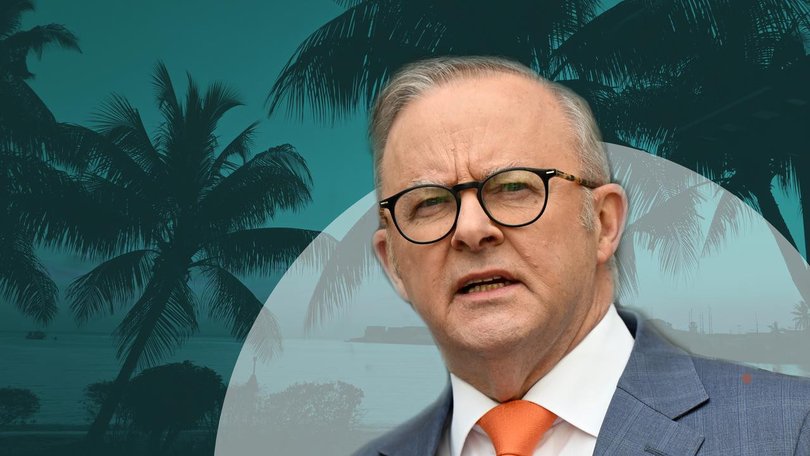PNG defence treaty: Pacific deal delays could catch out Anthony Albanese in the US
The failure to seal two regional deals could follow Prime Minister Anthony Albanese across the Pacific to a meeting with US President Donald Trump.

Anthony Albanese’s failure to land two major deals with Papua New Guinea and Vanuatu might not be a good look when he visits the United States next week.
After Labor in opposition accused the former Coalition Government of “dropping the ball” in the Pacific, the Albanese Government has worked to improve Australia’s engagement in the region.
But the two failures to sign off on major agreements with PNG and Vanuatu are not helping.
Sign up to The Nightly's newsletters.
Get the first look at the digital newspaper, curated daily stories and breaking headlines delivered to your inbox.
By continuing you agree to our Terms and Privacy Policy.The Prime Minister insists the delay in signing a “crocodile” defence treaty with PNG has “no downside”, brushing aside claims it’s an embarrassment for Australia.
He left Port Moresby on Wednesday without the hoped-for defence pact after the PNG Government’s cabinet failed to reach a quorum to sign off on the landmark agreement.
Instead, Mr Albanese and counterpart James Marape only managed a communique laying out the key tenets of the pact.
Mr Albanese also returned empty-handed from a visit to Vanuatu last week, failing to land a $500 million deal that would have given Australia veto power over Chinese investment in critical infrastructure.
Mr Albanese told reporters in Port Moresby after Wednesday’s signing of the communique that Australia expected the pact to be finalised in coming weeks.
When asked if it was embarrassing to come away without a signed treaty, Mr Albanese said the communique outlined precisely what was in it.
“There is no downside in this whatsoever,” he said.
Mr Marape said there was no “sticking point” holding up the signing and he expected a “quick turnaround” for his cabinet to approve it.
The Australian opposition said the Vanuatu agreement setback and the PNG pact delay was “just another embarrassment of the Prime Minister’s own making”.
“Repeated failures in the Pacific are undermining Australia’s standing in the region,” three shadow ministers said in a statement.
Shadow foreign minister Michaelia Cash, shadow defence minister Angus Taylor and shadow Pacific Islands affairs minister Jason Wood said the Coalition wanted the PNG treaty to succeed for regional security.
Next up for the Prime Minister is his visit to the US for the annual gathering of world leaders at the United Nations General Assembly.
A long-sought-after face-to-face with US President Donald Trump now appears confirmed, as Australia seeks to plead its case over trade tariffs.
The US expects Australia to maintain a strong security presence in the Pacific region and the failure of its PNG and Vanuatu deals meant missed potential, Lowy Institute research fellow Oliver Nobetau told AAP.
“This could have demonstrated that Australia and Papua New Guinea - it sees itself as a big brother - can maintain regional stability within the Pacific,” he said.
The stalled agreements were probably going to reinforce US perceptions that Australia could do more when it came to security in the Pacific, Mr Nobetau said.
The Government needed to go back to the drawing board to find a different diplomatic approach to instil confidence, especially among Melanesian nations, to sign on to such agreements, Mr Nobetau added.
Mr Albanese is also expected to raise the AUKUS trilateral security pact when he meets Mr Trump.
On Wednesday, Australia got unexpected support from King Charles, who was hosting the President at a state dinner at Windsor Castle in the UK.
During a speech, the king specifically mentioned the pact, which is currently being reviewed by the US to ensure it aligns with Mr Trump’s ‘America first’ focus
“Our AUKUS submarine partnership with Australia sets the benchmark for innovative and vital collaboration,” he said, as Mr Trump appeared to nod in agreement.
Under the $386 billion AUKUS deal, Australia is supposed to acquire three nuclear-powered Virginia-class submarines from the US in the early 2030s before a new fleet of boats is built for delivery from the 2040s.
The US is pressuring Australia to increase its defence spending to 3.5 per cent of gross domestic product.
